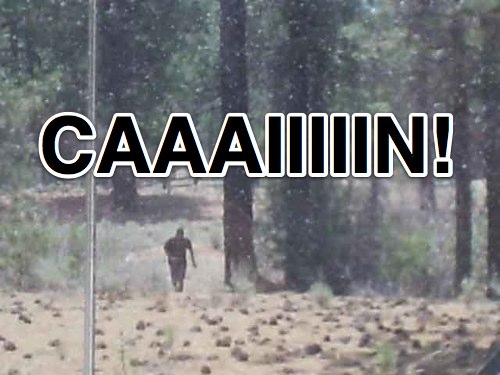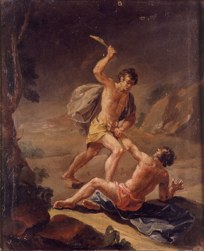Mormon Columnist: Bigfoot is Really Cain from the Bible
Posted by Justin on December 14th, 2011
Is the crypto creature known as Bigfoot really a religious icon doomed to walk the Earth for his sins? What could possibly doom one man to such a hell?
What if I told you that man was Cain. He who killed Able. Son to Adam and Eve. Maybe you’ve heard of him?

This theory comes according to a 2008 paper by then-Mormon Mentality blogger Matt Bowman. He bases his theory on a 1835 letter describing a meeting between David Patten and Cain.
Patten described the encounter thusly:
This is further corroborated by a 1919 manuscript which included a reference to an attack by a hairy, talking humanoid described as Cain.
As far as Bigfoot lore goes, this theory provides an out for at least one major hole. Bigfoot would be an immortal creature and not a new species which would explain why he’s so elusive. It’s far more of a challenge to catch one man than a thriving, natural animal bloodline.
Thanks to Tijuana Taxi on Twitter for this tip.
December 15th, 2011 at 3:15 am
Believe it or not, this is a fairly common folk doctrine among Mormons. I heard it all the time growing up here in Utah.
December 16th, 2011 at 8:44 am
Waitaminnit — in Beowulf, the poet claims that Grendel is from Cain’s clan.
Mormon Bigfoot: Big hairy beast with giant limbs who’s out to destroy men’s souls.
Grendel: Big hairy troll-like beast with giant limbs who destroys Geats, Speardanes, and other manly Scandinavians.
Connection?
*cough cough*
Wæs se grimma gæst Grendel haten,
mære mearc-stapa, se þe moras heold,
fen ond fæsten; fifel-cynnes eard
won-sæli wer weardode hwile,
siþðan him Scyppend forscrifen hæfde
In Caines cynne þone cwealm gewræc,
?ce drihten, þæs h? ?bel sl?g.